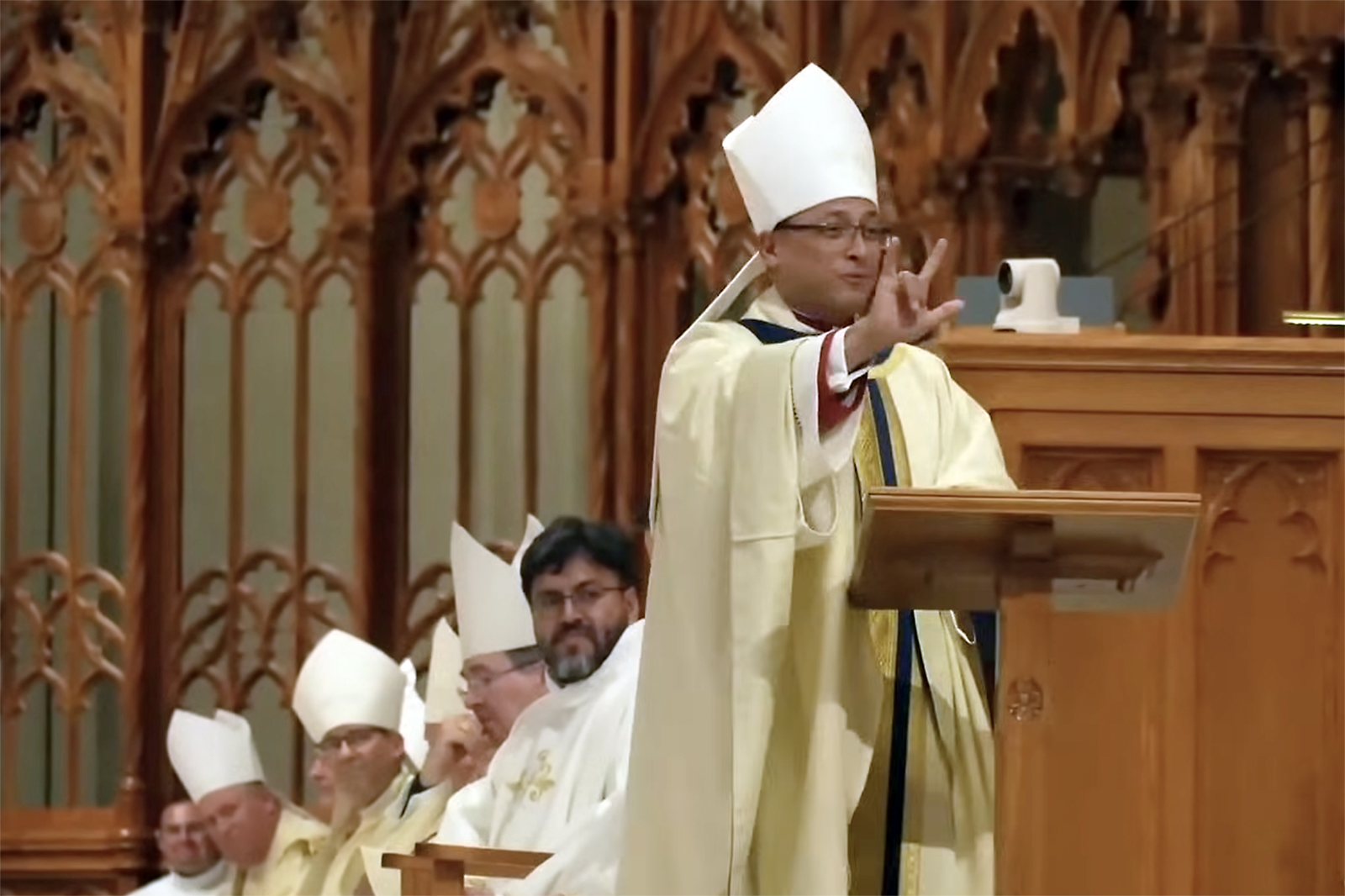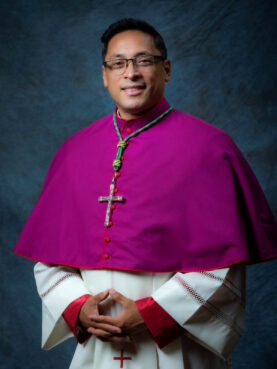
(RNS) — Pedro Bismarck Chau was 16 years old when he fled military conscription by the Nicaraguan Sandinista government into a civil war against U.S.-backed counterrevolutionaries in 1984.
As a teenager, he crossed the U.S. border pretending to be the son of a coyote, or human smuggler. He began working in a restaurant and later a factory without legal status or English fluency.
Becoming involved in the Catholic Charismatic Renewal movement, Chau said his faith deepened and he began to feel a call to the priesthood. He was ordained a priest in the Archdiocese of Newark, New Jersey, in 2008, earned a counseling degree and worked in parishes, campus ministry and as a chaplain for deaf Catholics. He also served as a representative for the V Encuentro, a major pastoral planning initiative for the U.S. Latino church.
Now a naturalized U.S. citizen, Chau, 57, was ordained an auxiliary bishop in Newark, becoming the first Nicaragua-born U.S. Catholic bishop earlier this month. He also became the second U.S. bishop to speak publicly about his experience living in the country as an immigrant without legal status.
He also takes on the role at a particularly fraught time for the Catholic Church in Nicaragua, where co-presidents Daniel Ortega and his wife, Rosario Murillo, have instituted an authoritarian crackdown on civil society and the church. According to leaders in exile, in recent years the government has imprisoned and exiled faith leaders and required priests to inform police if they are visiting sick people and to receive approval for their homilies. It has also banned Holy Week processions, has frozen or stolen bank accounts and has seized religious property.
In an interview on Friday (Sept. 26), Chau spoke with RNS about the church in Nicaragua, his ministry in the U.S. and his teenage struggle with suicidal ideation. The interview has been edited for length and clarity.

Auxiliary Bishop Pedro Bismarck Chau smiles after his episcopal ordination Mass at the Cathedral Basilica of the Sacred Heart in Newark, N.J., Sept. 8, 2025. Chau is the first Nicaraguan-born bishop in the United States. (OSV News photo/John Touhey, courtesy of the Archdiocese of Newark)
Have you heard from immigrants in Newark — especially those without legal status — about how they’ve felt about you becoming a bishop?
I’m working closely with the migrant ministry that Cardinal (Joseph Tobin) started here in the Archdiocese of Newark. We connect them with resources. We accompany them to their appointments at immigration offices. We’ve been working with families who have family members detained at Delaney Hall. This group of people have gone over there to support them, to pray with them, to give them comfort, to let them know (to) listen, the church is with you and God is with you. If we can help with resources, food — some people are afraid of going to the supermarket because they’re afraid they are going to be taken.
It’s been a beautiful experience because I know of the fear that they are experiencing. My experience is not as difficult as the experience that our immigrant people are experiencing today. I was afraid that la migra (U.S. Immigration and Customs Enforcement) would come to where I worked or wherever I was, but I was not afraid that they would come to my house. I can relate with them in the sense of you do whatever you need to do to provide for yourself and your family.
How would you evaluate how the U.S. Latino Catholic Church is doing right now?
We are the life of the church right now. Because people see our traditions and our processions, devotions that we bring to our churches, we are bringing the church back to life in the United States. We are a young church here, and bishops I think need to concentrate on that and to continue to form our people, continue to help them to fall in love with the Lord. We come to have the American dream in our lives, and sometimes that distracts us from focusing on the Lord.
Out of the V Encuentro came the need for leadership formation. I can speak on behalf of our Archdiocese of Newark that we have responded to that need. We just created a three-year plan for formation. It’s been a great response from the parishes.
As the Catholic Church suffers oppression in Nicaragua, what do you see as your role, especially now that you’ve been ordained a bishop?

Auxiliary Bishop Pedro Bismarck Chau. (Photo courtesy of the Archdiocese of Newark)
(In) solidarity with the diaspora of Nicaraguan people, I’ve been able to pray with them, to celebrate Mass. We have prayed the rosary together. We have come together in helping the refugees from Nicaragua, the 222 that came in February two years ago. I’ve met priests who have been exiled and invited me to be part of their monthly gatherings (via Zoom) that they have for prayer and reflection of Scripture. (It’s been) a blessing for me to be able to pray with them and hear their stories and hear their longing to return.
Prayer is the power that can go anywhere, right? So my prayers go to the church in Nicaragua, and I pray that the Lord may continue to give the strength and the courage to the Nicaraguan people and their leaders to continue to be the church, not to be afraid to speak the truth and to live for the truth.
Charismatic Catholicism was an important part of how you deepened your faith. Are you still involved?
Unfortunately, no. I still consider myself a charismatic spirituality person because that’s where my faith literally grew in Brooklyn. I came to Christ because of the Charismatic Renewal. It really is an outpouring of the Holy Spirit into the church — that spiritual hunger that a lot of Catholics and I had was satisfied by the Charismatic Renewal.
Within the Charismatic Renewal, you are formed. You listen to talks. You share Scripture with other people. You feel the desire go forth to preach the gospel as well. When I received Jesus in a special way in my heart, I didn’t want to stay still. I wanted to go out and tell the young people that Christ loved them, that no matter who they are, no matter what they have done with their life, God was calling them and wanted to transform them, and that God has a purpose for their life.
I wanted to go out there because that’s what I experienced. I kept believing a lie that my life had no purpose, that my life had no meaning. At the age of 17, 18, 19, that’s what I thought about my life. The thought of committing suicide came to mind. But thanks to our charismatic youth retreat in Most Holy Trinity in Williamsburg, my life changed.
As Catholic churches, we have the greatest gift, the Eucharist, and many Catholics don’t know that. The Charismatic Renewal helped me to, filled with the Holy Spirit, recognize God’s gift and beauty of the Catholic Church for the world.

The Rev. Pedro Bismarck Chau lies prostrate during his episcopal ordination Mass at the Cathedral Basilica of the Sacred Heart in Newark, N.J., Sept. 8, 2025. (Video screen grab)
How will you approach the topic of mental health as a bishop?
I met with priests in my region. I spoke about wanting to support my priests if they are feeling depression or stress. We need to work on that together, and they need to find help as well, not to be embarrassed to do that. Some people, especially the Latino community, think, “Oh, if you go to counseling, you’re crazy.” There’s stigma around counseling. There have been some unfortunately terrible, sad incidents of priests taking their own lives. So I want to take care of my brother priests, to let them know that I’m here for them. Thank God, I was able to obtain a license for counseling. So, I have the experience of helping them, not as a counselor, but more spiritually, that there is a way out to those feelings and emotions.
What do you think the church needs to do to make sure deaf Catholics can fully participate in the church?
What brought me to work with the deaf community was my sister. My sister is deaf. I saw how the Protestant church that she was attending, they would pick her up to bring her to church and drop her off because she didn’t have a car. All those kinds of resources and programs that make it possible for a deaf person to attend — having an interpreter at a Mass — things like that need to be worked on. The Catholic Church has to (step up). The Protestants are doing better work than we are.
The priests need to be offered the opportunity to learn sign language. My hope and prayer is that I’ll be able to connect with people who would like to support me and maybe send seminarians for immersion in sign language at Gallaudet University in Washington, D.C. I’ve gotten funding from (the Father John Foundation) to help maybe a seminarian or priest (take) classes for sign language. I’m hoping to grow that. Just like we need to have a Spanish ministry, we need to have a deaf ministry as well.
I do have a (deaf) 25-year-old Latino young man who says he feels a call to the priesthood. He’s very faithful. There are deaf priests in the United States — seven of them right now — so, it is possible. The diocese has to be able, willing to offer the resources for this young person to really attend seminary, have an interpreter there for the classes. Of course, it’ll cost some money, but my goal is that perhaps we can have sponsors.
If you are in crisis, call, text or chat with the Suicide and Crisis Lifeline at 988, or contact the Crisis Text Line by texting TALK to 741741.
